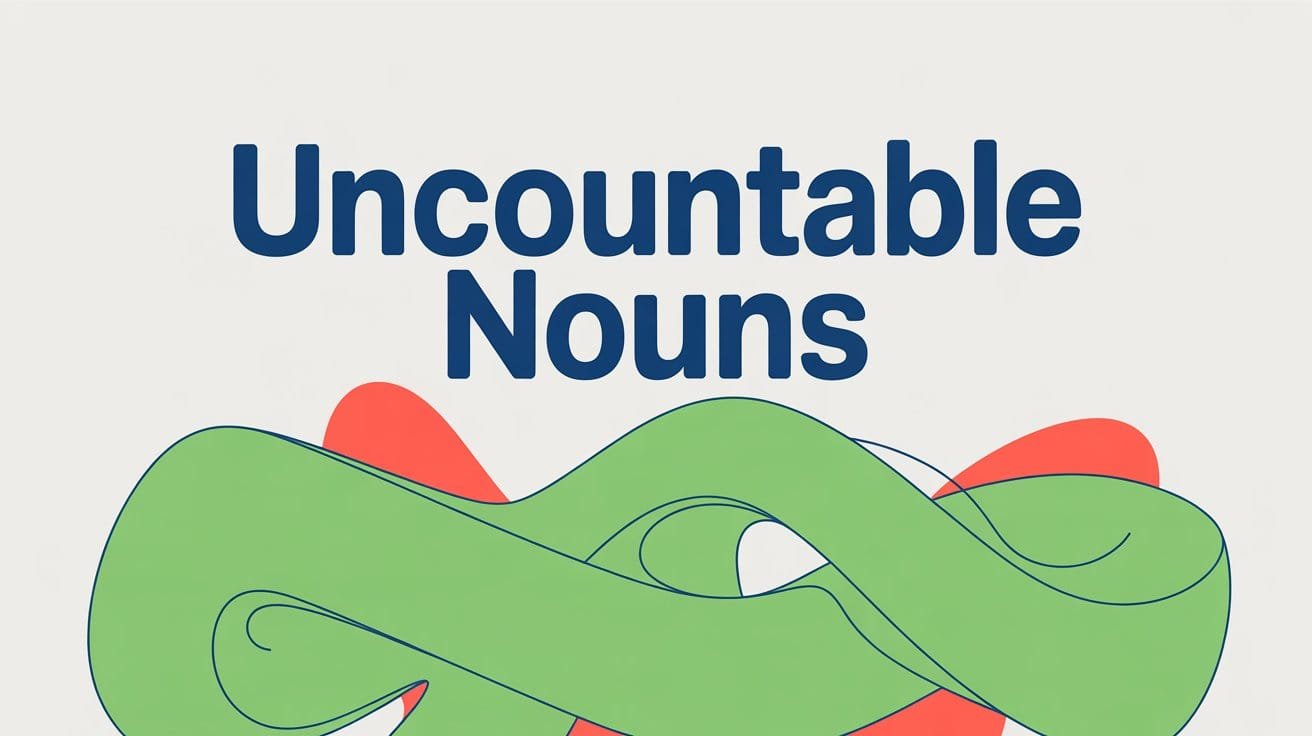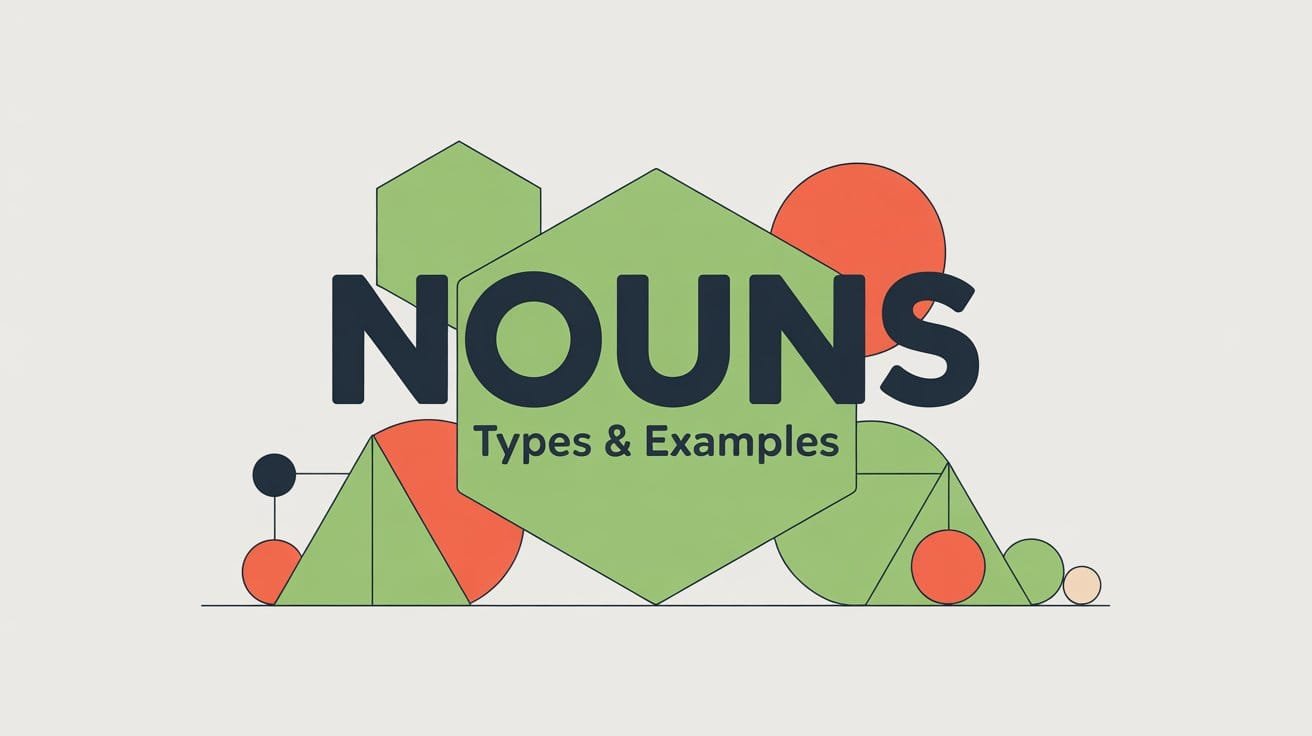Some nouns refer to things you can count, like chairs or books. Others refer to things you can’t count directly, such as milk, advice, or information. These are called uncountable nouns. They describe substances, ideas, or categories that are seen as a whole. You can’t say “two advices” or “a water” because these nouns aren’t used with numbers in the same way as countable nouns.
In this guide, you’ll learn what uncountable nouns are, how they work in sentences, how to recognize them, and how to avoid common mistakes when using them in writing and speech.
What Is an Uncountable Noun?
An uncountable noun (also called a mass noun) is a noun that refers to something that cannot be counted as individual units. These nouns represent things like substances, abstract concepts, or collective categories that are treated as a whole.
You can’t use numbers directly with uncountable nouns, and they don’t have plural forms. Instead of saying “two waters” or “many informations,” you would use expressions like “a glass of water” or “some information.”
Examples of Uncountable Nouns
- water
- furniture
- advice
- sugar
- knowledge
- traffic
Example: She gave me useful advice before the interview.
In this sentence, advice is uncountable. It refers to a general idea or category, not a specific countable item.
Characteristics of Uncountable Nouns
Uncountable nouns behave differently from countable ones. Here are the main features that make them easy to recognize:
They do not have a plural form
Uncountable nouns are singular by nature. You won’t see “waters”, “furnitures”, or “informations” in standard English.
Incorrect: He gave me many advices
Correct: He gave me some advice
They cannot be used directly with numbers
You can’t say “two rice” or “five music.” Instead, use a unit of measurement or a quantifier.
Examples:
- a bowl of rice
- a piece of music
They often describe abstract concepts, substances, or categories
Uncountable nouns include things like liquids, materials, feelings, and ideas.
Examples:
- Abstract: honesty, peace, information
- Substances: milk, oil, sand
- Collective categories: furniture, luggage, equipment
They take singular verbs
Even though they refer to mass or collective ideas, uncountable nouns pair with singular verbs.
Example: This information is helpful.
Subject-Verb Agreement with Uncountable Nouns
Uncountable nouns are grammatically singular, even when they refer to a large amount of something. That means they always take singular verbs in a sentence.
Use singular verbs with uncountable nouns
Examples:
- This milk is fresh.
- The information was incorrect.
- Furniture takes up most of the room.
Even if the quantity is large, the verb must stay singular.
Avoid plural forms with uncountable nouns
Incorrect: These luggages are too heavy.
Correct: This luggage is too heavy.
air with the right quantifiers
Instead of using numbers, use expressions like:
- some, much, a lot of, a little, plenty of
Example: - There isn’t much water left.
Getting subject-verb agreement right helps keep your writing grammatically accurate and easy to understand.
Common Categories of Uncountable Nouns
Uncountable nouns appear across many topics and categories. Here’s how they’re commonly grouped:
Substances and Materials
These include liquids, gases, powders, and raw materials; things you usually measure, not count.
Examples: water, milk, air, rice, sugar, oil, salt, sand
Abstract Concepts
These nouns describe ideas, qualities, or feelings; things you can’t see or touch.
Examples: love, happiness, honesty, knowledge, beauty, freedom
Collective Categories
Some uncountable nouns refer to groups of individual items treated as one whole.
Examples: furniture, luggage, equipment, traffic, clothing, jewelry
Information and Communication
These are nouns related to content, communication, or data.
Examples: advice, news, information, research, education
Uncountable Noun Examples in Sentences
- She has a deep respect for honesty.
- His happiness matters the most.
- The new furniture arrived yesterday.
- All the equipment was tested before the event.
- That was helpful advice.
- I don’t have enough information to decide.
- We need more sugar for the recipe.
Uncountable Noun vs. Countable Noun
The main difference between uncountable and countable nouns lies in how we measure or refer to them.
Countable Nouns:
- Can be counted as individual items
- Have both singular and plural forms
- Used with a/an, numbers, and words like many, few, several
Uncountable Nouns:
- Cannot be counted individually
- Do not have a plural form
- Used with words like some, much, a lot of, a little
| Countable Noun | Uncountable Noun |
|---|---|
| apple | water |
| coin | money |
| idea | advice |
| bag | luggage |
Using Uncountable Nouns in Writing
Uncountable nouns are common in both formal and informal writing, but they require careful handling, especially when it comes to articles, quantifiers, and agreement.
Don’t use numbers or “a/an” directly
Uncountable nouns can’t be used with a, an, or numbers by themselves.
Incorrect: an equipment, three informations
Correct: some equipment, a piece of information
Use appropriate quantifiers
Pair uncountable nouns with words like: some, much, a little, a lot of, plenty of
Examples:
- She has a lot of knowledge in this field.
- There isn’t much sugar left.
Use countable units when needed
When you need to count something uncountable, use a measure word or unit.
Examples:
- a glass of water
- two pieces of advice
- three bags of rice
Keep verbs singular
Always use a singular verb form with uncountable nouns.
Example: This research is important for the project.
FAQs About Uncountable Nouns
Can uncountable nouns ever be pluralized?
No. Standard uncountable nouns do not have plural forms. However, when referring to different types or pieces of something, we use countable expressions like types of cheese or pieces of furniture—not cheeses or furnitures.
How do I quantify uncountable nouns?
Use measurement words or phrases such as:
a cup of tea
a piece of advice
three bowls of rice
Are there nouns that are both countable and uncountable?
Yes. Some nouns can be both, depending on context. For example, Chicken (uncountable: a type of meat/countable: individual animals)



